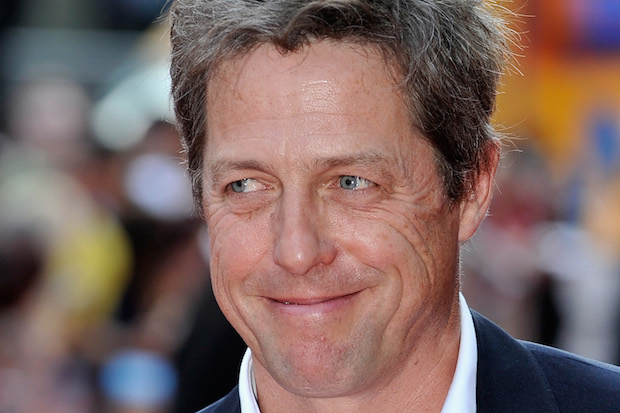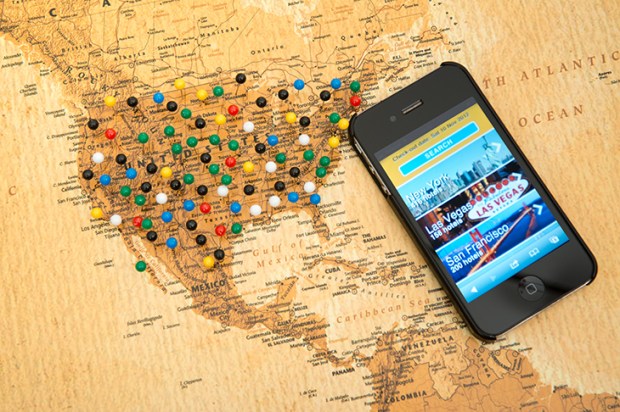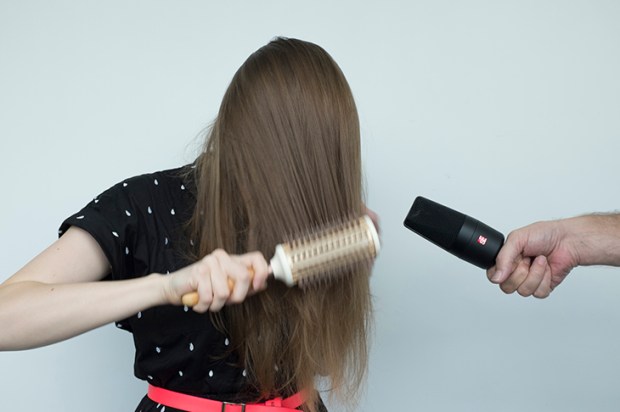I think the ancient English art of self–deprecation may be dying.
I don’t mean self-deprecation in its distorted and most exported form: pug-eyed rogues like Hugh Grant getting away with murder — more usually infidelity — by grinning and rubbing their hair. That’s different. That’s ‘bogus self-deprecation’, as my friend Stuart Reid used to say. What I mean is the assumption that you shouldn’t swank or push yourself forward; that in conversation it’s more polite, civilised, to downplay your own achievements, even and especially if you’re a great success.
I began to worry at a conference I was invited to last week: a day of lectures and advice for young people wanting to get ahead. Before the conference began, I met the speakers — a panel of international success stories in their thirties and forties. They were due to talk about ‘personal branding’, so I suggested, just in passing, that young Brits, brought up self-effacing, might be reluctant to brag.
What had been a genial atmosphere became in an instant frosty. An American woman in banking spoke for the group: ‘I can’t stand that attitude,’ she said, and her top lip tightened across her teeth, which is a sure sign of secret rage. I looked to a British speaker for sympathy, but she averted her eyes and her top lip twitched too. The Yank, the Brit, the Italian and Canadian, they all agreed: self-deprecation is irritating and outdated, moreover antithetical to advancing your personal brand. It belongs, they said, to a sort of Britishness that’s had its day.
Well, that was that. Outgunned and cowardly, I beat a retreat and considered their crossness. Is it that self-deprecation is difficult to decipher? I can see it’s frustrating to hear an Englishman say: ‘Oh, I’m not much good at tennis’, then ace the game. How’s a foreigner to know the clue is in the ‘much’? Or perhaps they sensed in self-effacement the bat-squeaks of secret superiority? Not needing to show off is, after all, the surest sign of self-confidence. But these weren’t (to their credit) the type who felt the need to cut others down to size. They didn’t resent confidence. It was weakness they despised.
The afternoon progressed in a series of talks all with the same essential message: just believe in yourself, don’t put yourself down. Have faith in ‘me’, these youngsters were told, and the world will unfold and deliver your dreams. And it was then that I understood, I think, what had riled those speakers: self-effacement is heretical these days. There’s an international gospel of self-belief and demurring just won’t do.
Nod, nod. Scribble scribble. All the boys and girls taking notes on how to grow their self-esteem. It made me want to weep — not because it’s crass so much as fundamentally untrue. Self-belief and self-promotion can get you to the top, but they probably won’t, all things considered, especially on their own. And then what’ll you do if you’ve been told that’s all you need — just keep believing? Lie awake at night, reciting your CV like a prayer?
Practise self-deprecation, I’d have said, if I’d had the stand that afternoon, and think of it as a hedge. It covers you in case of failure, and ensures you still have friends around if and when the world turns out not to be your oyster. If you think of it as weakness, ask yourself: what does the world really look like? Is everyone a winner? The 21st century may seem chock full of Ted talks, motivational speakers and self-belief seminars on YouTube. But those preaching the gospel are the lucky few, making an extra mint selling you self-belief.
It starts young these days, the idea that all you need is self-belief. I know an eight-year-old given a gold star the other day for ‘being the best me’; the Girl Guides latest innovation is a ‘self-esteem’ badge with the words ‘happy to be me’ embroidered in a circle.
This isn’t just a far cry from British self-deprecation, but also from the traditional American respect for success. That always used to come with an emphasis on hard work — admiring success as a corrective to old-world types justified by class alone. But this new transatlantic self-esteem doesn’t have to be deserved. A friend of mine met a teacher in the Midlands last week who said that before leaning over to correct or check a child’s work, she has been told to ask: ‘Can I invade your personal space?’ It signals respect for the child, said the head teacher. What it signals, in fact, is that respect doesn’t have to be earned.
Well, what I’d say now to that American banker, if I had the chance, is that at the heart of the gospel of self-belief are a few fundamental mistakes. First off, kids don’t need encouragement to believe in ‘me’. They have no trouble with that. They begin life unable to distinguish self from other, and it’s anyone’s guess as to when they twig that other people exist. It’s for parents and teachers to show them (lovingly) that the world does not revolve around them, which far from being undermining is (as I remember it) a relief. Second, as they grow up and try to get ahead, encouragement is nice, but for self-respect and happiness, there’s nothing like helping others. Taking yourself seriously is quite seriously depressing. As I was buying a coffee just now, there were little cards for customers to take on the till. Mine said: ‘I am unique and peerless in the whole history of the universe… The perfection of my life is my promise to myself.’ I’ve rarely felt so sad.
If she had listened long enough, I’d have added that self-deprecation isn’t antithetical to confidence, it’s complimentary. I might also ask her why it’s so difficult to be funny without an element of self-deprecation, to which the answer is that, secretly, we all know when we’re selling ourselves that we’re bullshitting, and we laugh with relief when someone points it out.
Got something to add? Join the discussion and comment below.
Get 10 issues for just $10
Subscribe to The Spectator Australia today for the next 10 magazine issues, plus full online access, for just $10.
You might disagree with half of it, but you’ll enjoy reading all of it. Try your first month for free, then just $2 a week for the remainder of your first year.















Comments
Don't miss out
Join the conversation with other Spectator Australia readers. Subscribe to leave a comment.
SUBSCRIBEAlready a subscriber? Log in